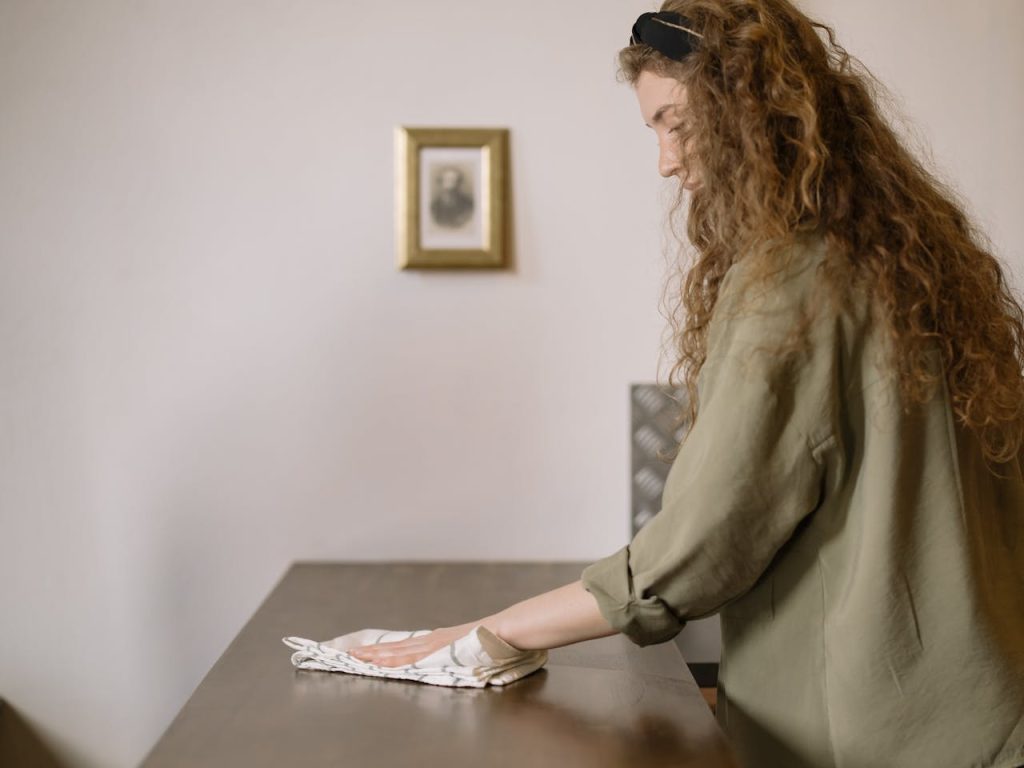
Whether you live alone or with a family, keeping your home clean can seem like a daunting task. A few small chores done daily can cut down on future scrubbing and scouring, and keep germs at bay.
Start with these 7 daily cleaning tasks to ensure your home is spotless year-round:
1. Vacuum
It’s no secret that a dirty home can harbor germs, cause respiratory illnesses and create bad odors. It can also impact the longevity of your flooring and upholstery. So, make it a point to vacuum your home daily. This will help remove dust, dirt and hair from the floor surfaces and keep the overall environment cleaner.
This is especially important if you have pets, as they tend to shed and leave behind dirt, dander, fleas and other allergens. Also, be sure to include the furniture surfaces in your room vacuuming routine.
If you want to streamline this cleaning task, consider investing in a lightweight vacuum, robotic vacuum or mop. A spin mop works well for wood or tile floors, while a Jet robot can efficiently clean hard-surfaced carpeting and laminates.
Another great tip is to keep a basket of cleanup wipes in each bathroom to quickly and easily clean surfaces when spills occur. This will help prevent stains and keep your floors cleaner, longer. You can even use a cleaning spray or degreaser to keep the area as fresh as possible and eliminate bad odors in the process. Keep in mind, that while these tasks are a must for every household, the number of times you do them will vary based on your home and lifestyle.
2. Sweep
There’s a certain level of peace that comes with a tidy house—but it takes work to get there. Instead of waiting until the couch has a layer of dog hair on it or you’ve run out of sponges, make small cleaning tasks a regular part of your household routine with these daily, weekly and monthly chores.
Sweeping helps to keep surfaces clean and free of dust, dirt and debris that can cause allergies and respiratory issues. It’s also an important part of a deep cleaning schedule, as it helps to prevent dirt and dust from building up in the corners of a room or under furniture.
Keep a cleaning caddy or bucket loaded with your favorite cleaners and carry it from room to room to streamline the cleaning process. It’s also a good idea to wash or sanitize your broom bristles, vacuum brushes, mops and buckets on a regular basis.
Another critical task to put on your daily list is dishwashing. Putting dirty dishes away as soon as you’re done with them prevents them from piling up and helps to keep your kitchen clean and free of odors. It’s a great habit to get into that will help you maintain a tidy home all year-round.
3. Dust
During the winter, dust tends to accumulate under furniture and in hard-to-reach places like along baseboards. You can help reduce this issue by putting a mat near each entryway to collect the majority of dust, dirt and other debris that gets tracked inside. In addition, reducing clutter on the floor by going through and organizing the piles of items can also help cut down on places for dust to build up.
Dust is more than just a nuisance, it can be harmful to your health. It contains pollen, car pollution particles, mold spores and even chewed-up wood dust from termites and other pests. Getting rid of these unhealthy particles in your home helps keep you healthy and prevents pests from living in your space.
Keeping up with dusting on a regular schedule keeps the problem under control. It is recommended to dust at least once a week. To make it easier to dust, consider keeping a small sponge and cloth in each room so that it is easily accessible for daily wipe-downs. Make sure to use a dry microfiber cloth on electronics and other delicate surfaces; if it becomes too wet, it can damage the item.
4. Wash Towels

Rather than saving up for a massive deep clean session on your cleaning schedule, you can simply keep certain areas of the house tidy on a daily basis to prevent buildup. This is especially helpful for surfaces that touch food, such as countertops and the stovetop. Wiping down these surfaces daily will help to eliminate crumbs and grime that could attract unwelcome critters. You can also arrange the belts in your closet to make it more neat.
You should also wash your towels on a regular basis. This is important because toweling off after a shower can actually spread bacteria from person to person, particularly if the towels are not properly washed. According to microbiologist Jason Tetro, towels can harbor potentially harmful microbes such as Staphylococcus aureus and its antibiotic-resistant variant MRSA as well as fungi that can cause itchy skin infections like athlete’s foot.
It’s best to wash your towels daily if possible, but at least once per week, he adds. To avoid over-washing and degrading the quality of your towels, it is advised to add a cup of vinegar to each load to prevent the buildup of soap residue and maintain their absorbency. If your towels develop funky odors or become discolored, this is a sign that it’s time to wash them again.
5. Wash Laundry
Clean laundry is essential for keeping your home looking neat and tidy. Make sure to run a load of laundry each day and hang or fold it promptly. This will prevent clothes from piling up on the floor, which can cause your space to look unkempt and cluttered. Also, remember to wash sheets and blankets regularly to keep them fresh.
Practicing these daily cleaning tasks will keep your house looking clean and organized year-round. These chores address messes before they become larger problems and prevent the need for time-consuming deep cleaning projects. Plus, if you can get into the habit of doing these small chores each day, it will make your weekly and monthly house cleaning tasks much easier to accomplish!
Larger cleaning and organization chores like vacuuming, sweeping, washing dishes, and wiping down high-touch areas should be done on a weekly basis. These chores tend to focus on areas that accumulate grit and grime on a frequent basis, such as kitchens, bathrooms, and entryways. They also include more frequent tasks such as tackling crumbs on countertops, sanitizing faucets and toilet seats, and wiping down food preparation surfaces. By completing these chores on a weekly basis, you’ll be able to reduce the amount of clutter throughout common spaces and minimize the need for time-consuming deep cleans.
6. Change Sheets
It’s a good idea to swap out your bed sheets on a regular basis to help reduce the build-up of dust mites and other allergens. You should also wash your sheets at least twice a year to keep them fresh and clean.
Sweeping the kitchen floor and wiping down countertops and appliances should be a daily routine in any home. This helps prevent pests from entering your kitchen and extends the life of your surfaces.
Some cleaning tasks may not need to be done on a daily basis, but rather once per week or every other week, such as washing your duvet covers, washing curtains, and washing linens. This way, you can still stay on top of the more pressing chores without feeling overwhelmed and having your weekends swallowed up by built-up chores.
When creating a house cleaning schedule, it’s important to make sure you have all the supplies and tools necessary before getting started. It can also be helpful to clean one room at a time. This way, if you feel like the task at hand is too large to tackle, it’s easy to pick up where you left off next time. For even more efficiency, consider enlisting family members or a professional cleaner to come in and do the job for you.
7. Make the Bed
There’s a certain peace that comes with a tidy home — but keeping up with small chores can seem daunting. Rather than waiting for an overwhelming mess to pile up, break cleaning tasks into daily, weekly and monthly routines.
These preventative cleaning tasks can save you from hours of deep cleaning later. And once you get into a rhythm, it becomes easier to stick with these small routines.
Make the bed: Putting away clothes, toys and other items in their proper places helps keep your bedroom clean. It also makes your room look more put together and organized — plus, it feels great to wake up in a fresh-made bed!
Do dishes: Washing and putting away dishes as soon as you finish using them avoids clutter and can even help keep your kitchen free of germs.
Clean as you go: Stock your bathroom and kitchen with all-purpose cleaner wipes, and use them to clean surfaces as you cook or work. This will give your space a more clean and refreshed appearance and extend the life of your favorite household cleaners.
These cleaning habits can help you achieve a consistently clean and comfortable living environment, without relying on marathon cleaning sessions before guests visit. With these simple tasks, you can say goodbye to spring cleaning, and hello to a spotless home all year round!
